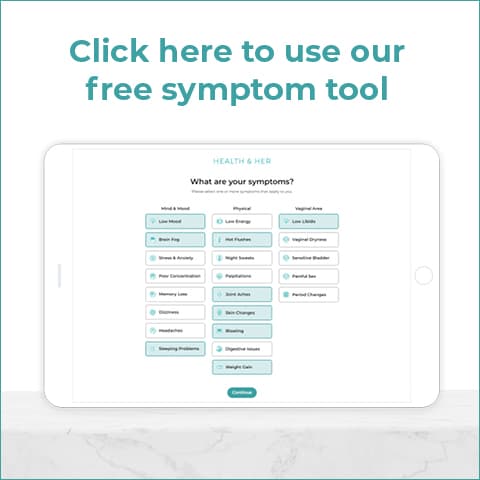by Anne Henderson, ⊕ medically reviewed by Dr Rebecca Tomlinson on 5th September, 2022
Suddenly having little leaks? Increased urinary frequency or urgency, and incontinence at menopause happens – even if you’ve never had problems in this area before – but you needn’t, and shouldn’t, just put up with it! Our Consultant Gynaecologist Anne Henderson explains why some women start having continence problems around menopause, and how you can act to improve the situation today and tomorrow.
Don’t pay attention to the ‘sensitive bladder’ marketing talk – get educated, get help, and get your pee-problems under control. Little leaks may have historically been a normal part of growing older for many women, but they needn’t be these days. The first step toward taking control is knowing what’s happening… and that starts with pressing play!
Prefer to read? Here’s the text version of Anne’s video
Changes to your urinary function – what’s going on?
Bladder function is one of the most common areas of the body to be affected during this period of a woman’s life. There’s a wide range of symptoms which can occur, and some women unfortunately experience them all.
- The common symptoms are urgency and frequency which can happen both day and night. When that’s happening overnight, it can be very disruptive as far as sleep is concerned.
- Some women also notice the sensation of incomplete bladder emptying and they may have a poorer urinary flow rate.
- They also experienced increased risk of urinary infections.
- Some women also start to experience leakage. So that could be stress leakage, for example when exercising, running or climbing stairs – but it can also happen involuntarily at rest.
Why do bladder and urinary changes happen?
The main driving force behind the urinary symptoms is declining oestrogen levels. This impacts directly on the bladder itself; the bladder lining and muscles; and also the muscles in the urethra which have a high level of oestrogen receptors. These areas don’t work so well as oestrogen levels decline.
Equally importantly, oestrogen is vital for collagen production in the pelvic floor. This is one of the reasons that women at this period of their lives notice an increased risk of vaginal prolapse and sometimes the womb and bladder can drop as well.
So you’ve got a combination of changes at receptor level which affects the bladder directly, as well as a general laxity in the pelvic floor. Those two factors combined can mean that women can experience quite a considerable range of symptoms.
If you’re thinking “I’ve not experienced this before”
Women who’ve had a vaginal birth may escape symptoms for years after they’ve given birth – particularly if they do the pelvic floor exercises – but suddenly they then get hit with the decline in oestrogen levels from 40s onwards. That has really detrimental impact on the pelvic floor in many women so it can accelerate the aging process in that area and that’s when they first become symptomatic.
How can it be treated or managed?
Firstly, I would encourage anybody with these type of symptoms to consider HRT either locally or systemically.
Local oestrogen (HRT that is applied to just the vaginal region) can be a fantastic way of controlling oestrogen deprivation in the bladder and the surrounding tissues because the treatment goes directly into that area and passes into the bladder and surrounding tissues so it can have almost an immediate effect. So you don’t have to have systemic HRT to get bladder benefits which many women find reassuring.
There’s also a wide range of other treatment options including pelvic floor physiotherapy which is absolutely vital.
- I would encourage all my premenopausal and menopausal women who have any pelvic floor issues or bladder issues to seek help from a specialist physiotherapist.
- Even women who find it difficult to do pelvic floor exercises can actually do very well with specialist input.
- And finally there are other options. ‘Bladder drills’ can help women keep control of their drinking habits – this means reduction in caffeinated drinks, timing their drinks and so on, and a physiotherapist should be able to give guidance as far as that’s concerned.
So, it’s not really just looking at one particular thing to provide a cure. Rather, we focus more at looking at the overall impact that these symptoms have on a woman’s health and work from there.
How can I get help?
I would actively encourage women to seek help with this as soon as possible with this group of symptoms. The sad reality is that if they’re developing symptoms in their 40s and early 50s, they will not improve as time goes by.
If women experience problems at this age, by the time they get to the 60s and 70s and beyond, they will be really struggling. The key thing is to seek help, take action, have intervention before it becomes irreversible.
What questions do other women ask about this?
Women do find it very difficult to discuss this issue – particularly if there’s incontinence involved – with friends with family. Sometimes when they see a specialist like myself, it’s the first time they’ve ever brought it out into the open and that can be a huge feeling of relief.
If you’re affected, be reassured that about 30 percent of menopausal women will experience urinary problems – it’s extremely common, and if they take action they should be fine.
The second question that women bring up “is this it – or will it get worse?” Many women have this understandable fear that they may become incontinent within a few years of menopause because of the sudden deterioration. Once again I would reassure them that preemptive intervention is key and they can actually stop the problem, if not reverse it, if they seek help.
About Anne Henderson
Our fantastic Consultant Gynaecologist Anne Henderson has worked within the NHS and private sectors for 15 years. From running large-scale menopause clinics where she helped hundreds of women access then-pioneering body identical hormones through to working with complementary practitioners to provide truly holistic care, Anne leads the way when it comes to caring, innovative, whole-woman focused practice.
Read Anne’s full biography here.
You might also be interested in…
Don’t let periods or leaks dampen your style with Stylist Gilly Woo
Dr Deborah Lancastle and Dr Shilpa McQuillan on Talking to you Dr about intimate symptoms


